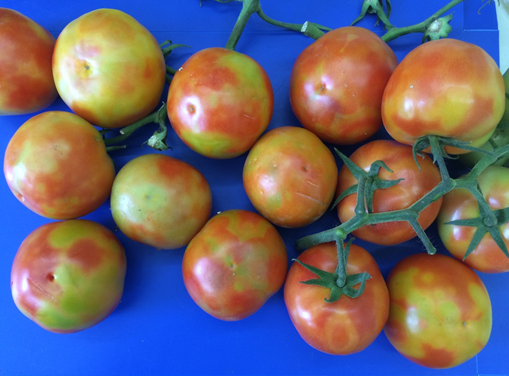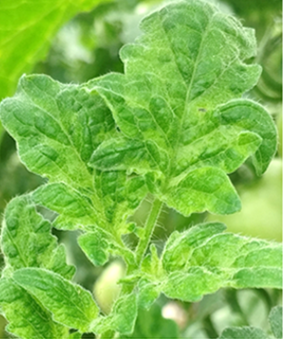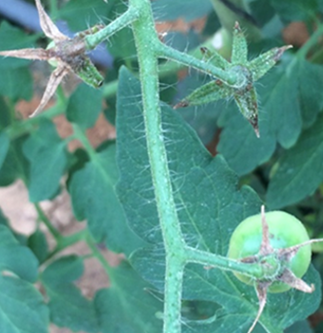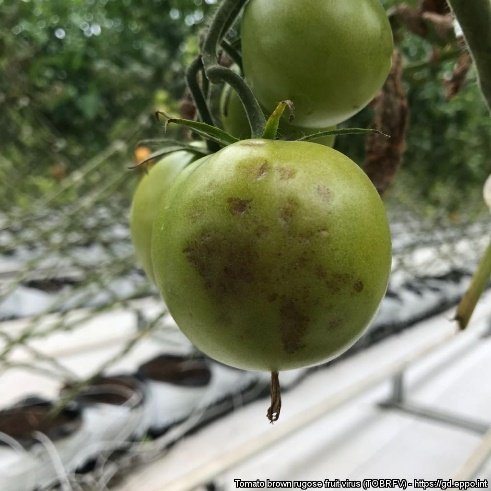Tomato brown rugose fruit virus
Tomato brown rugose fruit virus (ToBRFV) has been detected at a glasshouse tomato facility in northern Victoria.
For more information on the current situation see Tomato brown rugose fruit virus detected in Victoria.
What is tomato brown rugose fruit virus (ToBRFV)?
ToBRFV is a plant virus that affects tomato, capsicum and chillies.
It is a National Priority Plant Pest that poses a serious biosecurity risk to the vegetable industry in Australia.
There is no risk to food safety or human health from eating tomatoes with this virus.
What are the symptoms of ToBRFV?

Symptoms of ToBRFV in fruits include:
- chlorotic (yellow) spotting and marbling of fruits
- deformation and uneven ripening
- brown rugose (wrinkled) patches.
Symptoms of ToBRFV in leaves include:
- chlorosis (yellowing)
- mosaic pattern and mottling on younger leaves
- crumpling and deformation
- blister-like appearance on the top surface of leaves.




Image credits
- Figure 1. Photo courtesy of Aviv Dombrovsky, Agricultural Research Organization, Volcani Center
- Figure 2. photo courtesy of Luria et al., Agricultural Research Organization, Volcani Center, doi:10.1371/journal.pone.0170429
- Figure 3. photo courtesy of Luria et al., Agricultural Research Organization, Volcani Center, doi:10.1371/journal.pone.0170429
- Figure 4. photo courtesy of Diana Godinez, EPPO Global Database
- Figure 5. photo courtesy of Raed Alkowni, EPPO Global Database
What are the host plants in Australia?
- Major hosts of ToBRFV are tomato (Solanum lycopersicum), capsicum (Capsicum anuum) and chilli (Capsicum anuum).
- Some weeds, such as fat hen (Chenapodium murale), quinoa (Chenopodium quinoa), petunia hybrids (garden plants) and black nightshade (Solanum nigrum) can act as reservoirs for ToBRFV, allowing the virus to remain viable between growing seasons.
Why is it of concern?
ToBRFV is a Tobamovirus that causes serious economic damage to tomato, capsicum and chilli crops. It can cause yield losses of up to 70% and reduce marketable fruit yield by 10–15%.
ToBRFV spreads incredibly quickly and easily and can be difficult to manage once present in an environment. It easily overcomes the Tm-22 resistance gene that is commonly used against other serious Tobamoviruses. There are no tomato, capsicum or chilli varieties that are immune to ToBRFV infection.
History
- ToBRFV was first reported in 2014 on tomatoes in Israel. It has since been reported in Europe, the Middle East, China, Mexico and the United States. The wide distribution of ToBRFV has been attributed to the global movement of seed.
- ToBRFV was confirmed on 3 properties in South Australia in 2024 and one property in Victoria in January 2025.
Distribution
- ToBRFV was first reported in 2014 on tomatoes in Israel. It has since been reported in Europe, the Middle East, China, Mexico and the United States. The wide distribution of ToBRFV has been attributed the global movement of seed.
- ToBRFV has been detected on 4 properties in Australia and is under active eradication.
How is it spread?
ToBRFV is easily spread through:
- trade of infected seed, plants for planting, grafts and cuttings
- direct plant-to-plant contact
- touch transmission by handling contaminated tools, gloves, equipment and clothing.
Bumblebees have also been documented to spread ToBRFV during pollination activities.
The virus can remain viable in seed, plant waste and contaminated soil for months and once a crop is infected, the only way to eradicate the virus is by destroying all infected plants and material.
Advice to producers
To protect your property from this virus, producers are advised to practice good plant hygiene by:
- sourcing seed, seedlings and graft material that is free of the virus from a reliable supplier
- testing a proportion of seed and seedlings for the virus (see Crop Health Services)
- monitoring crops regularly for symptoms of the virus
- making sure staff and visitors comply with on-farm biosecurity and hygiene practices
- disinfecting tools, propagating material and equipment with sodium hypochlorite (1% solution of a 12% concentrate of pool chlorine). This is equal to 1 part pool chlorine to 10 parts water – or 1/3 of a cup in 1 L water.
- removing self-seeded or wild tomato plants and other hosts that could act as reservoirs for the virus.
Growers are strongly encouraged to familiarise themselves with the symptoms of ToBRFV infection on host crops and ensure that they have effective on-farm biosecurity practices in place, especially being vigilant for any unusual signs of virus infection on host crops.
Growers are also advised to contact their seed suppliers to seek their assurance about what specific testing has been applied to batches of seeds and whether they have been appropriately tested for ToBRFV.
Advice to home gardeners
Home gardeners are advised to:
- check plants regularly for unusual pests or signs of disease, including ToBRFV. Report anything unusual immediately to the Exotic Plant Pest Hotline on 1800 084 881
- source local seed, seedlings and graft material that is free of the virus from a reliable supplier or nursery.
Reporting an unusual plant insect pest or disease
Report any unusual plant pest or disease immediately using our online reporting form or by calling the Exotic Plant Pest Hotline on 1800 084 881. Early reporting increases the chance of effective control and eradication.
Please take multiple good quality photos of the pests or damage to include in your report where possible, as this is essential for rapid pest and disease diagnosis and response.
Your report will be responded to by an experienced staff member, who may seek more information about the detection and explain next steps.
Report online